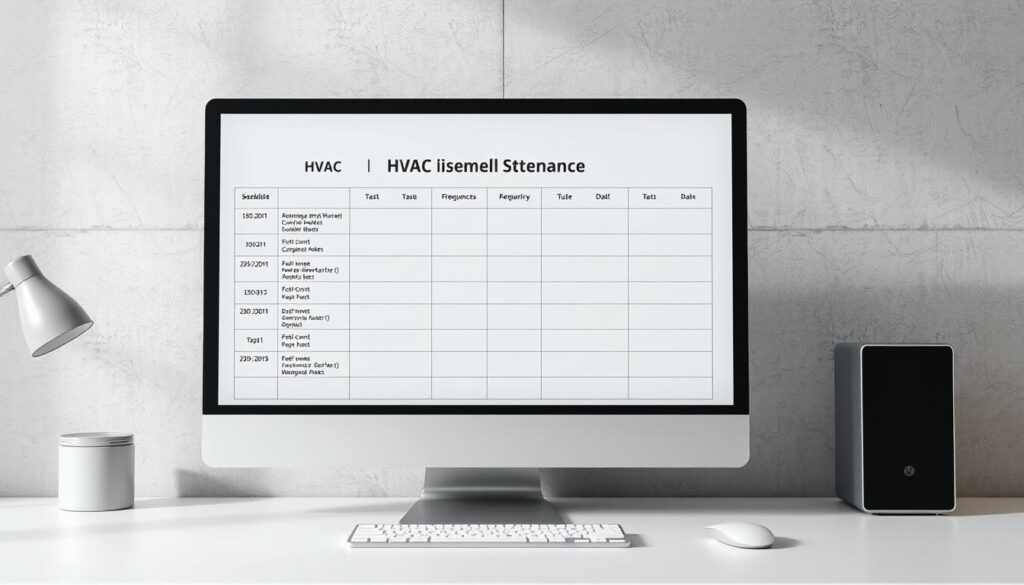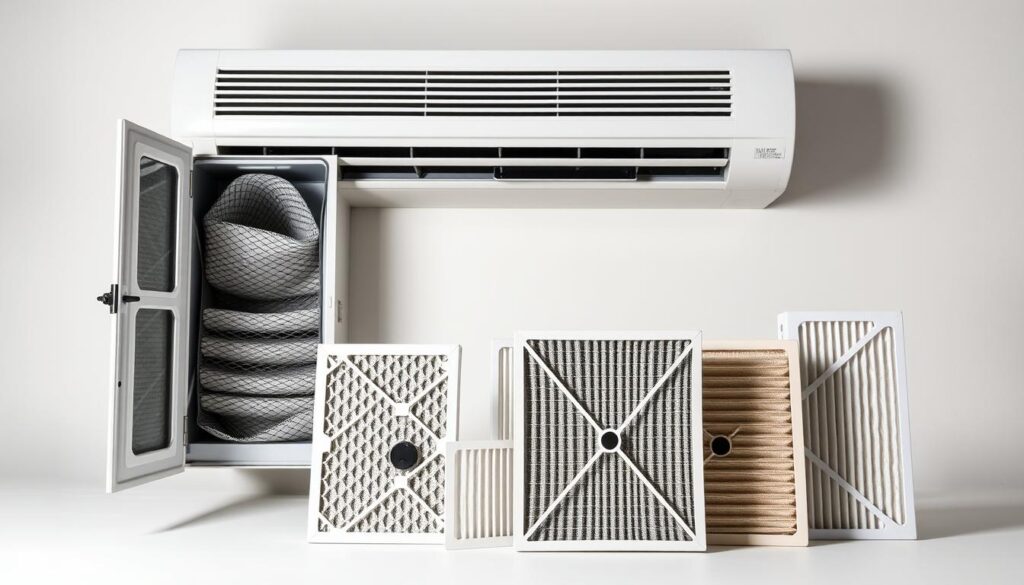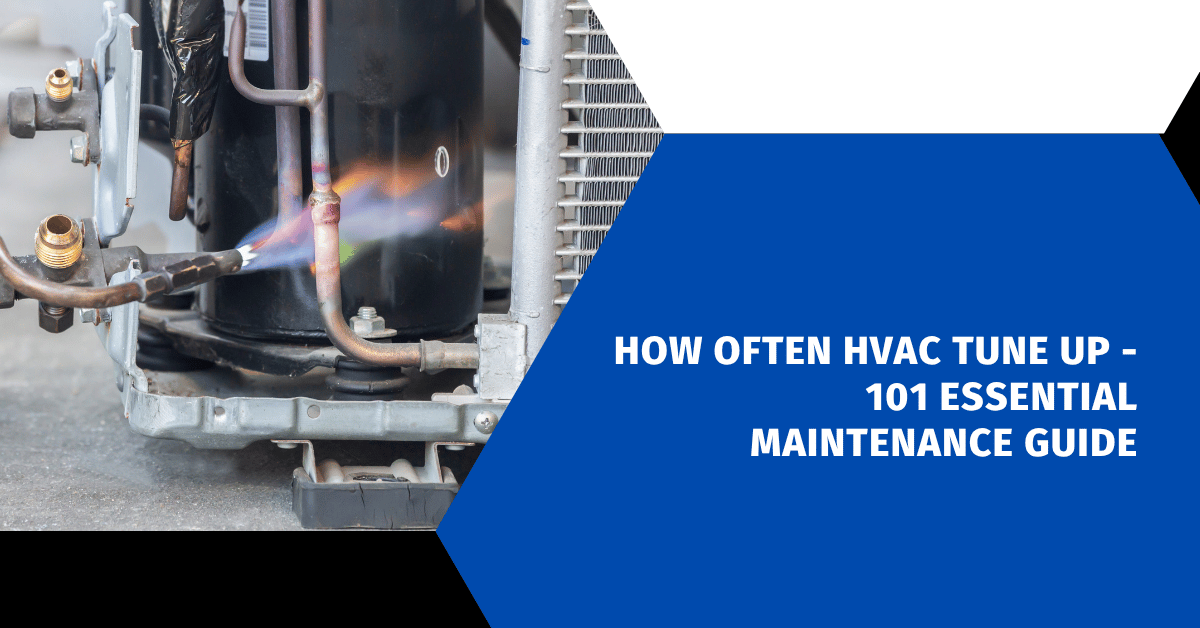Affiliate Disclosure
HVAC Guide Guys is a participant in the Amazon Services LLC Associates Program, an affiliate advertising program designed to provide a means for sites to earn advertising fees by advertising and linking to Amazon.
How Often HVAC Tune Up? Ever wondered why your neighbor’s HVAC works great while yours breaks down a lot? The answer is simple: regular tune-ups. Knowing how often to do them keeps your system running well.

Your home’s comfort depends on a good HVAC system. A solid maintenance plan does more than prevent breakdowns. It also boosts performance, saves energy, and makes your equipment last longer.
Experts say regular check-ups are key. They catch problems early, saving you money and avoiding big repairs. A little maintenance now can save you a lot later.
Key Takeaways
- Regular HVAC maintenance prevents unexpected system failures
- Professional tune-ups can improve energy efficiency
- Maintenance helps extend the lifespan of your HVAC system
- Annual inspections can identify problems early
- Proper maintenance reduces repair costs
Table of Contents
Understanding HVAC Maintenance Fundamentals
Keeping your home’s heating, ventilation, and air conditioning system in good shape is key. It ensures comfort, efficiency, and a longer lifespan. Regular inspections and maintenance are vital to avoid expensive repairs.
Each HVAC system has its own maintenance needs. Your home might have a central air conditioner, a heat pump, or a furnace. Each needs different care to work well.
- Central Air Conditioning: Needs tune-ups and filter changes seasonally
- Heat Pumps: Should be inspected every 6 months for best performance
- Furnace Systems: Require yearly cleaning and safety checks
Critical Components Requiring Regular Attention
Preventive maintenance focuses on important parts of your HVAC system. These parts affect how well your system works:
- Air Filters: Change every 1-3 months to keep air clean
- Electrical Connections: Check for loose wiring and safety risks
- Coils: Clean both indoor and outdoor coils for better heat transfer
- Refrigerant Levels: Check pressure and charge for efficiency
Professional Technician’s Role in System Care
Professional HVAC technicians have the skills you need. They do detailed inspections, find problems, and make sure your system runs efficiently. Their help can prevent sudden breakdowns and make your system last longer.
Regular professional maintenance is cheaper than replacing your entire HVAC system.
Explore Our HVAC Shop
Looking for top-rated HVAC tools, parts, and accessories? Visit our shop and find the perfect solution for your needs.
Visit the ShopHow Often HVAC Tune Up: Recommended Service Intervals
Knowing when to get your HVAC system checked is key to keeping your home comfy and efficient. Experts say you should get a professional tune-up at least once a year. This keeps your system running well.
Different HVAC systems need different care. This depends on:
- How old the system is
- What the maker says
- The local weather
- How much you use it
Here’s a quick guide on how often you should get your HVAC checked:
| System Type | Annual Maintenance Frequency |
|---|---|
| Central Air Conditioning | Once per year (before summer) |
| Heat Pump Systems | Twice per year (spring and fall) |
| Gas Furnace | Once per year (before winter) |
Pro tip: If your system is older or you live in a very hot or cold area, you might need to get it checked more often. This helps avoid sudden problems.
“Regular maintenance is the key to extending your HVAC system’s lifespan and maintaining peak performance.” – HVAC Industry Professionals
While getting a tune-up once a year is common, you should also check your filters and do basic checks every month. This helps your system work its best between professional visits.
Explore Our HVAC Shop
Looking for top-rated HVAC tools, parts, and accessories? Visit our shop and find the perfect solution for your needs.
Visit the ShopSeasonal HVAC Maintenance Schedule
Keeping your home comfortable and efficient needs a good hvac maintenance plan. This plan should change with the seasons. Your HVAC system needs special care all year to work well and avoid sudden failures.
Good hvac preventive maintenance means knowing what each season needs. With a detailed plan, you can make your system last longer and work better.
Spring Preparation for Cooling Season
Spring maintenance gets your air conditioning ready for the heat. Important steps include:
- Clean or replace air filters
- Inspect refrigerant levels
- Check condenser unit for debris
- Test thermostat functionality
- Lubricate moving parts
Fall Preparation for Heating Season
Before winter, your heating system needs a deep check and maintenance:
- Clean heating elements
- Check pilot light and electrical connections
- Inspect heat exchanger for cracks
- Verify gas pressure
- Test safety controls
Monthly Homeowner Maintenance Tasks
Doing regular monthly checks can really help your HVAC system:
- Examine air filters monthly
- Clear debris around outdoor units
- Check thermostat settings
- Listen for unusual sounds
- Verify proper airflow from vents
“Consistent maintenance is the key to a reliable and efficient HVAC system.” – HVAC Professional Recommendation
Proactive maintenance stops expensive repairs and keeps your home comfy all year.
Air Filter Maintenance and Replacement Guidelines

Keeping your HVAC filter clean is key for your system’s best performance and air quality. The right hvac filter replacement can boost your energy efficiency and keep your home’s air clean.
Different air filters need different care. How often you need to replace them depends on a few important things:
- Filter thickness
- Household air quality
- Number of occupants
- Presence of pets
- Local environmental conditions
Standard disposable filters should be replaced every 1-3 months. Homes with pets or lots of dust may need to change theirs more often. Thicker, high-efficiency filters can last up to 12 months, depending on how much they’re used.
“Clean filters are the heart of an efficient HVAC system” – HVAC Professional Maintenance Guide
When picking a new filter, think about these important points:
- MERV rating (higher ratings catch more particles)
- Filter material quality
- Compatibility with your HVAC system
- Budget considerations
Regular hvac filter replacement does more than just clean the air. It also saves energy. A clean filter helps your system work better, which can cut your monthly energy bills by 5-15%.
Explore Our HVAC Shop
Looking for top-rated HVAC tools, parts, and accessories? Visit our shop and find the perfect solution for your needs.
Visit the ShopProfessional HVAC Tune-Up Checklist
When you get an hvac system inspection, experts do a full check to make sure your system works well. Knowing what happens in a tune-up helps you choose the right hvac contractor near me.
A professional HVAC tune-up is more than just maintenance. It’s a detailed process to stop breakdowns and make your system work better.
Critical System Inspection Points
- Electrical connection assessment
- Thermostat functionality verification
- Refrigerant level evaluation
- Airflow measurement
- Mechanical component inspection
Comprehensive Cleaning and Adjustment Procedures
Your HVAC technician will clean and adjust important parts to make sure your system works right:
- Clean condenser and evaporator coils
- Lubricate moving mechanical parts
- Clear condensate drain lines
- Tighten electrical connections
- Calibrate system controls
Performance Testing and Calibration
The last step is testing to check if your system is working efficiently. Technicians will:
- Check system startup and shutdown sequences
- Measure temperature differentials
- Test safety controls
- Evaluate overall system efficiency
Investing in professional HVAC maintenance helps prevent unexpected breakdowns and extends your system’s lifespan.
Benefits of Regular HVAC Maintenance

Keeping your home comfortable and efficient starts with regular HVAC maintenance. Routine tune-ups offer many benefits beyond just checking the system. They help boost your hvac energy efficiency and extend your hvac unit’s lifespan.
Let’s look at the main advantages of maintaining your HVAC system:
- Improved Energy Performance
- Reduces energy consumption by up to 15%
- Lowers monthly utility bills
- Minimizes unnecessary energy waste
- Extended System Longevity
- Prevents premature system failure
- Reduces risk of major breakdowns
- Protects your significant home investment
Professional maintenance gives you a deep look into your system’s performance. Technicians can spot issues early, preventing costly repairs and keeping your HVAC running smoothly.
“Preventative maintenance is the key to long-lasting, efficient HVAC performance.” – HVAC Industry Expert
Regular maintenance brings real financial and comfort gains. With routine check-ups, you get steady indoor temperatures, better air quality, and big savings over time.
| Maintenance Frequency | Energy Efficiency Impact | Potential Cost Savings |
|---|---|---|
| Annual Tune-up | Up to 15% improvement | $300-$500 per year |
| Bi-Annual Inspection | Up to 20% improvement | $500-$700 per year |
Investing in your HVAC system today means protecting your home’s comfort and your wallet tomorrow.
Explore Our HVAC Shop
Looking for top-rated HVAC tools, parts, and accessories? Visit our shop and find the perfect solution for your needs.
Visit the ShopCost Considerations for HVAC Tune-Ups
Understanding the cost of HVAC maintenance is key to smart home decisions. When looking for an hvac contractor near me, think about both upfront costs and long-term savings.
The cost of an hvac tune-up varies from $75 to $200. Several factors influence this price. Your specific cost will depend on:
- System complexity
- Local market rates
- Age of your HVAC system
- Specific service requirements
Breakdown of Maintenance Expenses
Let’s look at the financial side of regular HVAC maintenance:
| Maintenance Type | Estimated Cost | Potential Savings |
|---|---|---|
| Annual Tune-Up | $100-$200 | Up to 15% on energy bills |
| Emergency Repair | $300-$1,500 | Avoided through preventive maintenance |
| System Replacement | $5,000-$10,000 | Potentially extended by 5-10 years |
Long-Term Financial Benefits
Regular HVAC maintenance is a smart financial move. Professional tune-ups can lower energy use, prevent expensive repairs, and extend your system’s life.
“Regular maintenance is the most cost-effective way to keep your HVAC system running efficiently.” – HVAC Industry Expert
By setting aside for annual maintenance, you’ll save money over time. This ensures your home stays comfortable all year.
Signs Your HVAC System Needs Immediate Service
Spotting problems early can save you money and prevent system failure. Your HVAC system sends out warning signs that need quick attention.
During an hvac system inspection, experts look for key signs that your system needs help. Spotting these signs early can stop big problems before they start.
- Unusual Noises: Grinding, squealing, or banging sounds mean there’s a mechanical issue
- Inconsistent Temperatures: If rooms don’t cool or heat evenly, it’s a problem
- Reduced Airflow: Weak air from vents could mean ductwork or motor trouble
- Increased Energy Bills: A sudden jump in electricity costs means your system is not working well
Look out for these warning signs that mean you need a pro:
| Warning Sign | Potential Problem | Recommended Action |
|---|---|---|
| Strange Odors | Electrical burning or musty smell | Immediate system inspection |
| Frequent Cycling | Compressor or thermostat malfunction | Professional diagnostic check |
| Water Leaks | Condensate drain blockage | Urgent repair needed |
Don’t wait until your HVAC system breaks down. Catching problems early and getting quick professional help can make your system last longer and save you from expensive fixes.
Explore Our HVAC Shop
Looking for top-rated HVAC tools, parts, and accessories? Visit our shop and find the perfect solution for your needs.
Visit the ShopExtending Your HVAC System’s Lifespan Through Maintenance
Protecting your HVAC unit lifespan starts with preventive maintenance. Regular care can extend your heating and cooling system’s life. This can save you thousands of dollars in replacement costs.
Most HVAC systems last 15-25 years with proper care. Without it, they often fail in 10-15 years. Your efforts can greatly improve system performance and longevity.
- Clean or replace air filters every 1-3 months
- Schedule professional inspections twice annually
- Keep outdoor units clear of debris
- Maintain consistent thermostat settings
- Check refrigerant levels regularly
HVAC preventive maintenance is more than just changing filters. Professional technicians can spot issues early. This prevents costly repairs and keeps your system running efficiently.
| Maintenance Level | Average System Lifespan | Potential Cost Savings |
|---|---|---|
| Minimal Maintenance | 10-12 years | Low |
| Regular Maintenance | 15-20 years | High |
| Professional Annual Care | 20-25 years | Very High |
Investing in your HVAC system’s health is wise. Regular maintenance protects your investment. It also keeps your home comfortable for years.
Conclusion
Maintaining your HVAC system is key. Your maintenance schedule is vital for its performance and avoiding breakdowns. Knowing when to get HVAC tune-ups helps keep your home comfortable and saves money on repairs.
Regular maintenance does more than prevent problems. It also makes your system work better and last longer. Experts say to get thorough inspections twice a year, in spring and fall. These checks catch issues early, avoiding big problems later.
Good maintenance is not just about calling professionals. Changing filters monthly, keeping outdoor units clean, and watching your system’s performance also helps. This care not only saves money but also keeps your home cozy all year.
Don’t wait to book your next HVAC tune-up. It’s good for your system and your wallet. A well-kept HVAC is an investment in your home’s comfort and efficiency.

